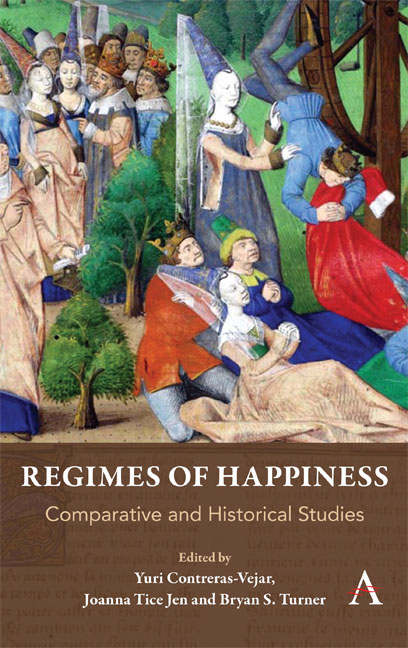Book contents
- Frontmatter
- Contents
- Acknowledgements
- Notes on Contributors
- Introduction: Reflections on Regimes of Happiness
- Part I Happiness in the West
- Part II Comparative Perspectives
- Chapter Ten And You Should Be Nothing but Happy: Judaism and the Dual Approach to Joy
- Chapter Eleven Happiness in Medieval Islamicate Literature: Conceptual and Practical Problems
- Chapter Twelve From Liberation to Happiness: The Making of Modern, Middle-Class Yoga
- Chapter Thirteen The Pursuit of Happiness in Vietnam
- Chapter Fourteen Indigenous and Western Views of Happiness: An Essay on the Politics of Contentment
- Chapter Fifteen A Nineteenth-Century Turning Point: Nietzsche, Weber, Freud and Mill
- Index
Chapter Ten - And You Should Be Nothing but Happy: Judaism and the Dual Approach to Joy
from Part II - Comparative Perspectives
Published online by Cambridge University Press: 29 May 2019
- Frontmatter
- Contents
- Acknowledgements
- Notes on Contributors
- Introduction: Reflections on Regimes of Happiness
- Part I Happiness in the West
- Part II Comparative Perspectives
- Chapter Ten And You Should Be Nothing but Happy: Judaism and the Dual Approach to Joy
- Chapter Eleven Happiness in Medieval Islamicate Literature: Conceptual and Practical Problems
- Chapter Twelve From Liberation to Happiness: The Making of Modern, Middle-Class Yoga
- Chapter Thirteen The Pursuit of Happiness in Vietnam
- Chapter Fourteen Indigenous and Western Views of Happiness: An Essay on the Politics of Contentment
- Chapter Fifteen A Nineteenth-Century Turning Point: Nietzsche, Weber, Freud and Mill
- Index
Summary
Since the Biblical era, the quest toward happiness has been a chief focus of Jewish practice. However, the questions of how to be happy and the nature of happiness have often been in dispute. Judaism is a religion born of the influences around it. As Jews moved from place to place and encountered new peoples and ideas, they merged these novel approaches into their collective philosophical frameworks. Like the archaeological tel, these new idea were built atop the foundation of older ideals, creating tensions and contractions within which insights were forged. The Jewish approach to happiness is a wonderful microcosm of this phenomenon.
Bryan Turner and Yuri Contreras- Vejar, in their work on happiness, have identified a fundamental tension in the way societies have understood the concept. This tension can best be identified as the imagined dialogue between Aristotle and Saint Augustine. For Aristotle, happiness was of this world. To be happy was to attain pleasure in life through companionship, the fulfillment of ideals and self control. Saint Augustine had a very different idea. For him, happiness was found with God. In his view, one should look for divine favor and love outside of this world and the search would bring us joy and fulfillment.
The Jewish view on happiness was forged in the space between this dialectic, with some voices in the tradition choosing a happiness rooted in the experiences of the everyday world while others pursued a path through Divine connection. Even when both are options, there is debate around how much of each to include in the lifelong project of finding joy. Perhaps the most famous example of this tension appears in a talmudic discussion around the proper way to celebrate the Jewish holidays.
For it was taught: R. Eliezer says: On a Festival, a man has should either eat and drink or sit and learn. R. Yehoshua says: Divide it— half of it for the Lord [and] half of it for yourselves. R. Yochanan said: Both drew their inference from the same Scriptural verse[s]. One verse states: A solemn assembly to the Lord your God (Devarim 16:8) and another verse reads: You shall have a solemn assembly (Bamidbar 29:35).
- Type
- Chapter
- Information
- Regimes of HappinessComparative and Historical Studies, pp. 155 - 170Publisher: Anthem PressPrint publication year: 2019



